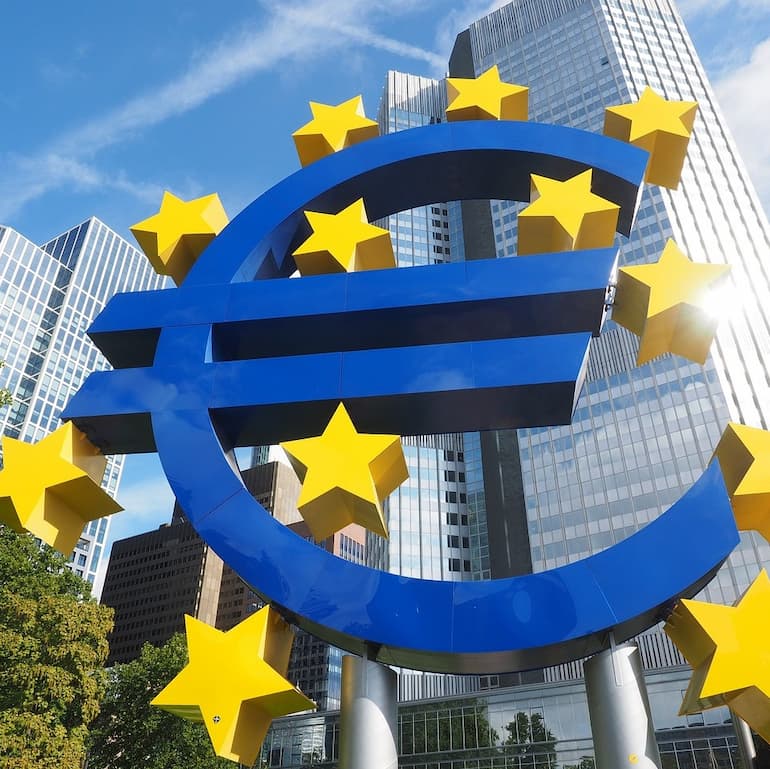Strategy
Eurozone Inflation Falls To Lowest Level Since 2021 – Reactions

After Eurozone inflation fell again in September by more than expected, investment managers discuss the impact.
Eurozone inflation dropped to 4.3 per cent in September from 5.2 per cent in August - its lowest level since 2021 - according to flash estimates from the EU statistics agency Eurostat. The figures suggest that efforts to curb inflation in the zone are paying off, hopefully bringing closer the point at which rate hikes will peak.
Core inflation, which excludes volatile fuels and food prices, fell by more than analysts expected to 4.5 per cent from 5.3 per cent, strengthening hopes that the European Central Bank won’t raise interest rates further. The central bank has said that interest rates, which currently stand at a high of 4 per cent, would be set at sufficiently restrictive levels for as long as necessary for a timely return of inflation to its 2 per cent target.
Energy inflation was sharply negative at 4.7 per cent in September whilst food inflation stood at 8.8 per cent, down from 9.7 per cent last month. Services inflation stood at 4.7 per cent, compared to 5.5 per cent in August, with wage growth pushing input costs higher for service providers.
In the UK, interest rates are currently higher than in the eurozone at 5.25 per cent, but UK inflation is also higher at 6.7 per cent. See here.
For 2025, the ECB anticipates inflation to average 2.1 per cent in the eurozone.
Here are some reactions from investment managers to the drop.
Daniele Antonucci, chief investment officer, Quinet
Private Bank (parent of Brown Shipley)
“The sharper-than-expected deceleration in Eurozone inflation
versus consensus estimates is probably a lesser surprise for
market participants than it may appear at first sight. That said,
all key inflation components did show further slowing, from
energy and food to the less volatile, and more important for the
European Central Bank outlook, services and non-energy
manufactured goods.
“Even though inflation remains elevated in the region, it seems
to be on a clearer downward trend. Some distortions caused by
last year’s transport subsidies and fuel discounts in Germany
dropping out of the year-on-year comparison may suggest this
month’s data should be taken with a pinch of salt.
“However, more fundamentally, there is evidence that higher
interest rates are having their intended impact: inflation is
falling; activity is slowing, and the eurozone looks set to enter
recession. This is why the messaging from central bankers is
beginning to point to a peak in rates. That’s not to say that the
inflation battle is won, but the tide is turning. We believe that
central banks will keep rates elevated over the coming months to
ensure there’s no inflation resurgence.
“The clear risk here is rising oil prices and some surveys on
inflation expectations are beginning to reflect consumer concerns
about energy once again. The important thing, though, is that
these elevated rates will put pressure on economic activity. As
rates peak, bonds become more attractive. Historically, their
yields tend to trend in line with central bank rates. Therefore,
we believe now is a good time to add longer-dated Eurozone bonds
to portfolios to capture this higher yield before it trends
lower, while also adding a cushion should the economic outlook
deteriorate.”
Clemence Dachicourt, senior portfolio manager,
Morningstar Investment Management Europe
Limited
“Today’s drop in headline inflation back to levels last seen in
October 2021, is very good news for the European Central Bank,
which currently faces a difficult conundrum. While the ECB has
shown a strong determination in bringing down inflation closer to
its 2 per cent target after it raised interest rates for a tenth
consecutive time in September, its efforts are precipitating the
eurozone into a potentially deep and long-lasting recession. The
latest economic numbers published in the eurozone clearly
indicate that the region currently sits in contractionary
territory, however, the labour market remains strong.
“While we feel the ECB is very close to the end of its tightening
cycle, it will need to be convinced that the ‘inflationary
psychology’ has been extinguished before it can declare victory
against inflation. Markets will therefore be carefully watching
the possible spill-over effects that higher energy prices may
have on prices of consumer goods or services. In a world of a
tight labour market, higher than expected inflation will likely
lead to workers pushing for higher wages, which could reignite
the inflation spiral.”